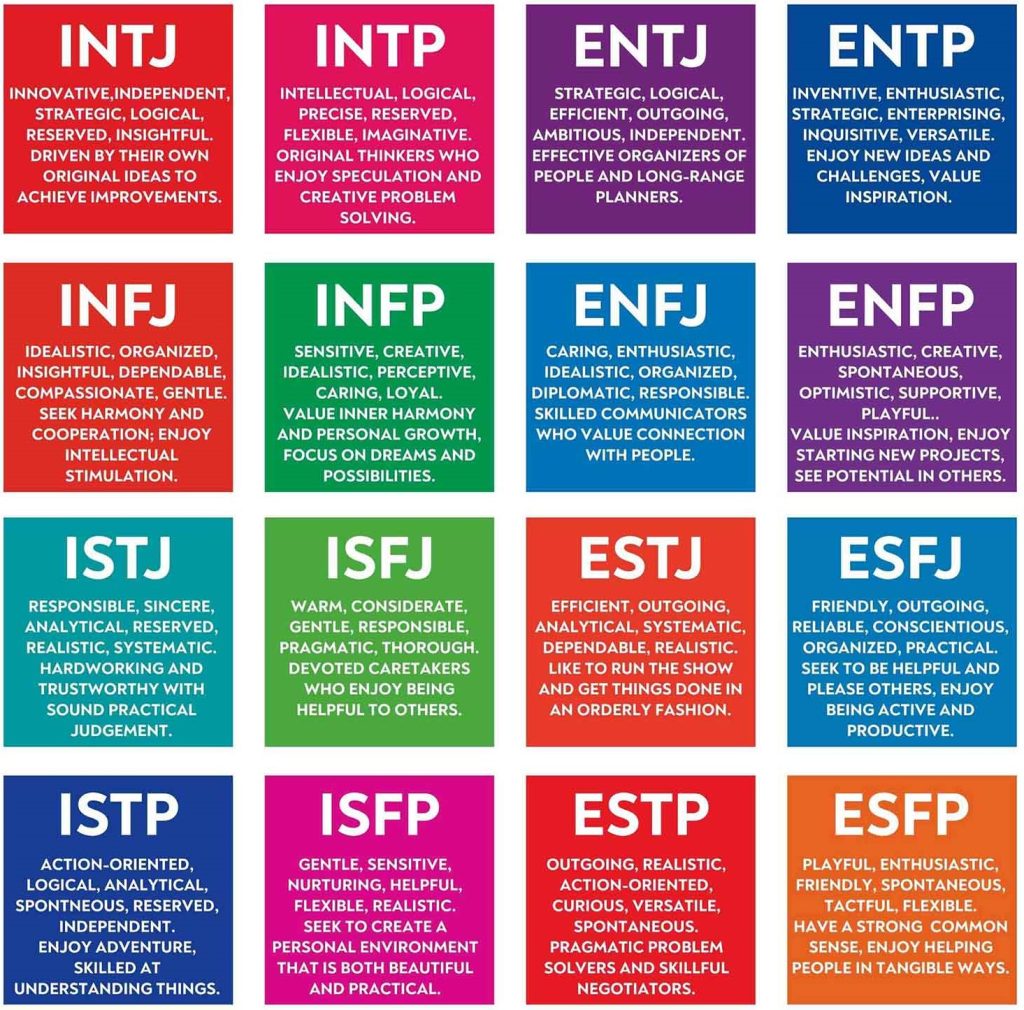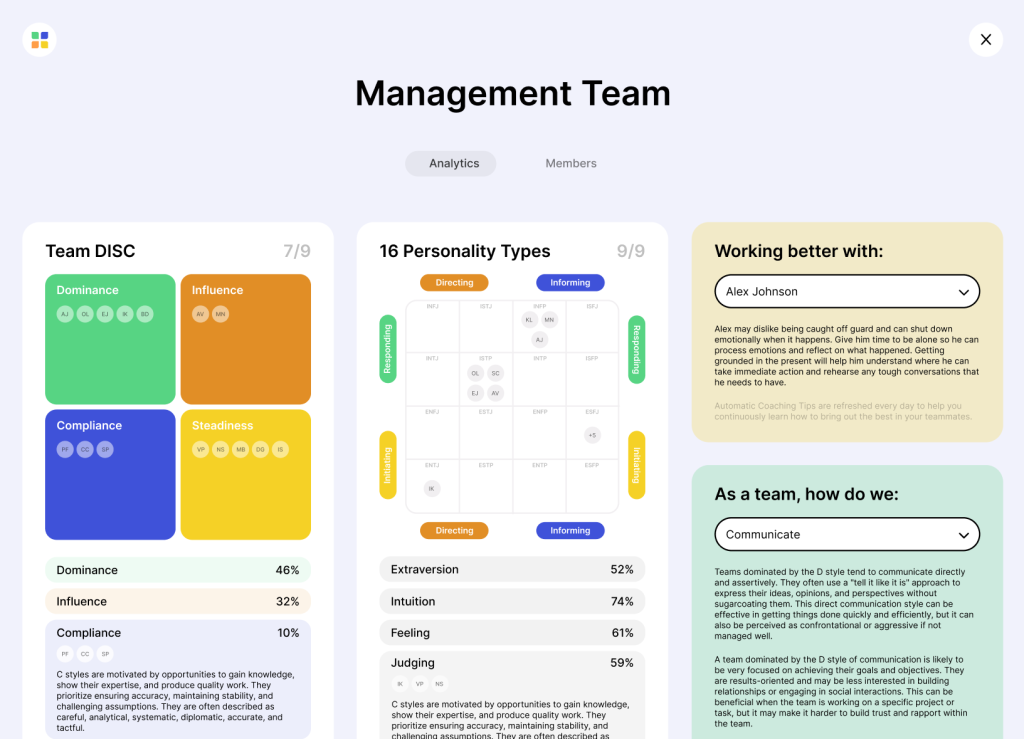Have you ever wondered why you click with some people but not others? The MBTI test claims to have the answers. This fascinating psychometric instrument, the Myers-Briggs Type Indicator (MBTI), offers intriguing insights into our personality traits and preferences.
In this MBTI test review or Myers-Briggs test review, we delve deeper into the theory that makes it a popular tool for personal and professional development.

What is the MBTI Test?
The MBTI, or Myers-Briggs Type Indicator, is a personality assessment tool created by mother-daughter duo Katharine Cook Briggs and Isabel Briggs Myers. Developed in the early 20th century, it was rooted in the typological theories of renowned psychologist Carl Jung. Briggs and Myers expanded on Jung’s work to create a tool that could help people understand themselves and others better, ultimately enhancing personal growth and human interaction.
How Does the MBTI Assessment Work?
The 16 Personality Types
The core concept of the MBTI test is categorizing personality into 16 types. These types are determined by one’s preferences in four dichotomies:
- Extraversion vs. Introversion,
- Sensing vs. Intuition,
- Thinking vs. Feeling, and
- Judging vs. Perceiving.
Each dichotomy represents a continuum; individuals can fall anywhere for each pair.
The Four Dichotomies
Extraversion versus Introversion is about the direction of one’s energy, either outward towards people and activities or inward towards thoughts and ideas.
Sensing versus Intuition focuses on gathering information through concrete facts or interpreting and adding meaning.
Thinking versus Feeling is about the basis of one’s decisions through logical analysis or considering what is essential to people.
Judging versus Perceiving deals with how one deals with the outside world, either in a planned, orderly way or spontaneously and flexibly.
Each person’s preferences in these areas combine to form one of the 16 personality types. For instance, someone who prefers Extraversion, Sensing, Thinking, and Judging would be classified as an ESTJ. Understanding these types and dichotomies gives individuals better insight into their personalities, work styles, and relationships.

What Do Psychologists Think of MBTI?
Psychologists hold various views on the Myers-Briggs Type Indicator (MBTI). Some appreciate its simplicity and ease of use, while others criticize its lack of empirical support and theoretical inconsistency.
Critics of the MBTI often point out the lack of scientific evidence supporting its validity and reliability. Many psychologists argue that the test lacks predictability and that people’s types can change depending on their mood when they take the test.
Also, the binary nature of the MBTI dichotomies is seen as overly simplistic and unable to capture the complexity of human personality. The dichotomies imply a forced choice between two extremes, while most people fall somewhere in between.
Some psychologists find inconsistencies in the MBTI’s theoretical framework. The theory assumes that personality is static and doesn’t consider the possibility that people can, and often do, develop and change over time.
The MBTI also believes that people only use one preference in each dichotomy, which contradicts the idea that various factors influence human behavior and can vary according to different situations.
Conversely, some psychologists appreciate the MBTI for its practical applications. Despite the criticisms, they value how it prompts individuals to reflect on their behaviors and preferences, an essential step towards self-awareness and personal development.
It’s also used extensively in organizational settings for team building, communication training, and leadership development.
While the MBTI is not without its flaws, its popularity remains. As with any psychological tool, its value primarily depends on how it’s used and interpreted.
Can My MBTI Results Change Over Time?
The notion of personality flexibility within the MBTI framework is debated. From a theoretical standpoint, MBTI subscribes to the belief that one’s personality type is fixed and unwavering. However, critics argue that this conflicts with the dynamic nature of human personality, which is subject to evolution over time.
As we accumulate life experiences, go through different phases, or encounter significant events, our behaviors, preferences, and ways of thinking may change.
Certain factors may precipitate changes in our MBTI type. These could be significant life events such as a career change, the birth of a child, or a personal tragedy. These experiences can reshape our perspectives and behaviors, suggesting a significant difference in our personality. A person who was once an extrovert may turn introverted after experiencing a life-altering event.
There’s also the argument about whether the change in MBTI is real or perceived. The nature of the MBTI test itself could be a contributing factor. The MBTI test is situation and mood-dependent, meaning that your responses are based on your current state of mind, which can fluctuate.
If you’re in a particularly social mood, you might test as an extrovert, but if you take the test in a more reflective mood, you might try as an introvert. This doesn’t necessarily indicate a personality change but reflects our mutable attitudes and circumstances.
An additional angle to consider is the balance of preferences. MBTI works on the assumption that we only use one selection in each dichotomy. Yet, human behavior isn’t strictly dichotomous.
We are complex beings capable of operating outside our comfort zones and utilizing different modes of thought and behavior as the situation demands. This complexity could be interpreted as a change in MBTI type when, in reality, it manifests latent or underused preferences.
While the MBTI framework isn’t built to accommodate personality change, the conversation around this possibility continues. Reflecting on this debate encourages a deeper understanding of human nature and the tools we use to comprehend it.
Is the Myers-Briggs Type Indicator (MBTI) Reliable?
The concept of personality fluidity can significantly impact the perceived reliability of the MBTI. As people evolve, so does their self-perception, which can influence their responses to the MBTI test. This can lead to varying results, raising questions about the test’s reliability.
However, proponents of the MBTI argue that these changes reflect deep-seated personal growth, thereby adding another layer of insight into an individual’s personality rather than detracting from the test’s reliability.
Self-awareness is also a critical factor in assessing the MBTI’s reliability. The test relies on honest self-reporting; thus, an individual’s level of self-awareness can significantly influence the results.
The more self-aware individuals are, the more likely they are to answer the MBTI questions truthfully, thereby increasing the test’s reliability.
On the contrary, a lack of self-awareness or a tendency to respond based on idealized self-perceptions can lead to skewed results, affecting the perceived trustworthiness of the test.
Like any personality assessment tool, the MBTI has its strengths and limitations. The key lies in understanding its design and purpose, using it as a guide rather than an absolute measure of personality.
At What Age Is MBTI Accurate?
Determining the age at which the MBTI becomes accurate is a challenging task. The essential reason is that personality traits continually develop and mature, especially during early childhood and adolescence. During these stages, individuals explore their identities, test boundaries, and experience many situations that contribute to their personal development.
According to the MBTI, the manifestation of personality traits may not be entirely precise in childhood. Factors such as parental influence, fluctuating emotional states, and a limited understanding of the self can sway the accuracy of the test results.
Remembering that children are still figuring out their identities and preferences is essential. For instance, a child might prefer playing alone (an introvert trait) but could also enjoy group activities (an extrovert feature). Thus, relying solely on an MBTI test for children might lead to a misinterpretation of their evolving personalities.
The stage of adolescence is a period of significant personality development. Teenagers make more independent decisions, form their unique worldviews, and gradually understand their strengths and weaknesses.
The MBTI could potentially provide a helpful framework to guide self-awareness and personal growth at this stage. Yet, it’s crucial to remember that adolescence is often marked by emotional turbulence and identity exploration, which can reflect fluctuating MBTI results.
By the time an individual reaches adulthood, their personality traits tend to be more stable. The experiences they’ve accumulated over their formative years shape their preferences, attitudes, and behaviors.
Consequently, the MBTI test taken during adulthood may yield more consistent and accurate results. However, the accuracy still depends on the individual’s self-awareness and honesty in responding to the test items.
Lastly, the question of the age at which MBTI becomes accurate hinges on the acceptance of personality fluidity. If you believe personality evolves, you might argue that the MBTI can only be as precise as self-perception.
Therefore, rather than seeking a definitive age for MBTI accuracy, it might be more beneficial to view the MBTI as a tool for understanding and navigating the fluid landscape of human personality.
Why Take the MBTI Test?
Understanding your personality type through the Myers-Briggs Type Indicator (MBTI) test offers numerous benefits, including career guidance and improved interpersonal relationships.
Career Guidance
The benefits of the MBTI test come through in career guidance. The MBTI can be a valuable tool for career exploration and planning. By identifying individuals’ personality preferences, the test can provide insight into potential career paths that align with those preferences.
For instance, an individual who prefers extraversion may thrive in careers involving extensive social interaction, such as sales or public relations. In contrast, someone with an introverted preference might find satisfaction in roles that allow deep thought and introspection, such as research or writing.
Therefore, the MBTI can provide a direction for individuals undecided about their career path or those contemplating a career change.
Relationship Compatibility
The MBTI can also aid in improving interpersonal relationships. Understanding your and others’ personality types can increase empathy and better communication.
For example, if you’re an individual with a sensing preference, you prioritize facts and details, whereas someone with an intuitive choice focuses on concepts and possibilities.
Recognizing these differences can prevent misunderstandings and facilitate effective communication.
Moreover, understanding our personality type and the types of others can enhance our tolerance and acceptance of diversity. It can help us appreciate the unique strengths that different types bring to relationships, teams, and organizations. This understanding can lead to more robust, harmonious personal or professional relationships.
The Pros and Cons of the MBTI Personality Test
Pros of the MBTI Test
The Myers-Briggs Type Indicator (MBTI) Test brings several advantages. Its simplicity and ease of use make it accessible for individuals at different stages of life. It provides a straightforward language for discussing personality, creating complex psychological concepts that are more digestible for the average person.
Additionally, the MBTI test’s wide application is another significant advantage. It’s used in various fields, including career counseling, education, leadership, team building, and relationship counseling. As such, it serves as a versatile tool for understanding human behavior.
The MBTI test fosters self-awareness and empathy. By understanding their personality type, individuals can gain insight into their strengths, weaknesses, preferences, and potential growth areas. This can lead to improved decision-making in careers, relationships, and other life domains.
Cons of the MBTI Test
However, the MBTI test is not without its disadvantages. A major critique is the lack of scientific backing. Critics argue that the test’s dichotomous categories oversimplify the complexity of human personality. For example, labeling someone as an introvert or extrovert disregards the reality that people can exhibit both traits, depending on the situation.
Another downside is the potential for stereotyping. Labeling people according to their MBTI type can lead to pigeonholing or typecasting, limiting our perceptions of their capabilities. This can restrict personal growth and even lead to discrimination in worst-case scenarios.
Moreover, the MBTI test’s reliability and validity have come under scrutiny. The test often produces different results when retaken after a certain period, questioning its stability. Critics also point out that many of its type descriptions are vaguely worded and positive, leading to the so-called “Forer effect,” where people believe the definitions apply to them more than they do.
It’s essential to approach the MBTI test as a tool rather than a definitive answer. While it can provide valuable insights, it’s crucial to remember that personality is complex and multifaceted, and a single test cannot adequately capture it.
How To Take the MBTI Test
Defining the process of taking the MBTI test requires us to discuss two main options: Online and In-person assessments. Both have unique advantages, and the choice largely depends on your preferences and circumstances. Here’s an MBTI test guide for these occasions.
Online vs. In-person Assessments
Online MBTI tests have gained popularity due to their accessibility and convenience. You can take the test at your own pace, in the comfort of your home. This eliminates the stress and time constraints often associated with in-person tests.
However, the lack of a trained professional’s guidance might lead to misinterpretation of questions, impacting the accuracy of results.
In contrast, although less convenient, in-person assessments offer the advantage of professional guidance. Trained administrators can clarify any ambiguities and ensure you understand each question correctly, leading to more accurate results.
Additionally, they can provide a personalized debriefing of your results, facilitating a deeper understanding of your personality type.
Tips for Accurate Results
No matter the method of administration, there are a few essential tips to ensure the accuracy of your MBTI test results. Honesty is the cornerstone of any self-assessment. It’s easy to respond based on how you wish to be perceived rather than your true nature. It’s essential to answer each question based on your natural tendencies and not on how you aspire to be.
Avoid overthinking the questions. Your first instinct is usually the most accurate reflection of your personality. Trying to dissect or overanalyze the questions can lead to skewed results.
Additionally, make sure to consider your behaviors across different contexts. Many people behave differently at work, home, or social gatherings. Try to answer based on your most consistent behaviors across these different settings.
Finally, remember that the MBTI test has no right or wrong answers. It’s not designed to judge but to understand and appreciate the diversity of human personality. Be open and receptive to whatever personality type you identify with, remembering that each style has unique strengths and potential areas for growth.
Real User Reviews and Testimonials
Users have reported that one of the significant advantages of the MBTI test is its ability to provide clarity and understanding of one’s personality. Many positive reviewers have praised the test’s depth and dimensionality in capturing various aspects of their characters.
They noted that the results helped them understand their strengths and preferences better, which, in turn, guided them in career choices and interpersonal relationships.
Positive Review Highlights
Some MBTI test user reviews point to MBTI as a “revelation,” as it helped them make sense of their actions and reactions. They appreciated how it validated their innate preferences, making them feel understood and less alone in their unique way of experiencing the world.
Another user mentioned the value the MBTI brought to their team at work. The team took the test together, and understanding each other’s personality types improved their communication and cooperation, leading to a more harmonious and productive work environment.
However, not all reviews about the MBTI test were positive. A few users criticized the test for being too rigid and binary, stating that human personalities are more fluid and cannot be boxed into 16 categories. They also questioned the reliability of the test due to the inconsistency of the results.
Negative Review Highlights
One user shared their dissatisfaction, primarily because their results differed each time they took the test, causing them to doubt its reliability. They felt that the test failed to account for the complexity and dynamic nature of the human personality. Another user resonated with this sentiment, expressing that the trial tried to oversimplify their character, leading to a sense of misrepresentation. They argued that the MBTI test should account for a spectrum of behaviors rather than fixed categories.
Overall, while many users find value in the insights provided by the MBTI test, it is evident that some feel the tool has its limitations. Therefore, using the MBTI test as one of many tools for self-understanding rather than a definitive measure of personality may be most beneficial.
Conclusion
The Myers-Briggs Type Indicator test, like any psychological evaluation tool, serves a purpose, yet it is not without its limitations.
The MBTI test should be utilized as a guide to personality traits rather than as an absolute authority. By incorporating additional tools and perspectives, individuals can gain a more comprehensive understanding of their unique personalities and those of others.

